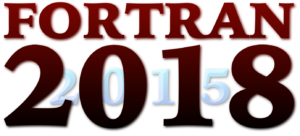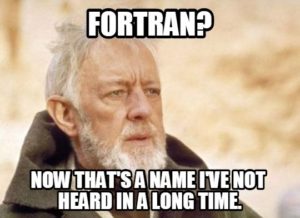Fortran 2018

The upcoming Fortran standard formerly known as Fortran 2015 has a new name: Fortran 2018. It was decided to change it in order to match the expected year of publication. This makes sense. The previous standard (Fortran 2008) was published in 2010.
Waiting for an updated Fortran standard is an exercise in Zen-like patience. Almost a decade after Fortran 2008, we'll get a fairly minor update to the core language. And it will be years after that before it's fully supported by any compiler that most users will have available (gfortran still doesn't have a bug-free implementation of all of Fortran 2008 or even 2003). Fortran was essentially reborn in the Fortran 2003 standard, which was an amazing update that brought Fortran into the modern world. It's a terrific programming language for scientific and technical computing. However, the limitations are all too clear and have been for a long time:
- We need better facilities for generic programming. It's impossible to do some things without having to duplicate code or use "tricks" like preprocessing or include files (see JSON-Fortran for examples).
- We need some kind of exception handling. Fortran does have a floating-point exception handling feature, but honestly, it's somewhat half-baked.
- We need a better implementation of strings. Allocatable strings (introduced in Fortran 2003) are great, but not enough, since they can't be used in all instances where strings are needed.
- We need the language to be generally less verbose. I'm tired to having to type multiple nested SELECT TYPE statements to do something that is a one liner in Python (sure I know Fortran will never be as succinct as Python, but some of the verbosity required for object-oriented Fortran is just perverse).
- We need any number of new features to make it easier to extend the language with third-party libraries (so we don't have to wait two decades for a feature we want).
- We also need the language development process to embrace a more open collaborative model using modern tools (Usenet is not the future). I guess the recent survey was unprecedented, but it's not enough.
Fortran is a programming language that needs a better PR department. Legacy Fortran codes are being rewritten in C++, Python, or even Julia. NASA frequently throws massive Fortran 77 libraries with decades of heritage (e.g., DPTRAJ/ODP, GTDS, SPICELIB) into the trash in order to rewrite it all from the ground up in C++, without ever considering Fortran 2003+ (or maybe not realizing it exists?). The information about modern Fortran on the internet is spotty at best, outdated, or downright wrong (what is the deal with REAL*8?). In popular consciousness Fortran is mostly a punchline (usually something to do with punchcards and your granddad). A language like Python (which was never designed for technical computing) is now seen by many as a superior solution for technical computing. Matlab refers to itself as "the only top programming language dedicated to mathematical and technical computing"! The Julia website lists somewhat misleading benchmarks than implies that C, Julia, and even Lua are faster than Fortran.
Now, get off my lawn, you kids!

See also
- N2144 Results of Straw Poll on Changes to the Fortran Draft Standard [JTC1/SC22/WG5]
- S. Lionel, "Eighteen is the new Fifteen", November 20, 2017 [Intel]
- Fortran standards committee Fortran 202x Feature Suggestions Survey [Surveymonkey]
- When will see Fortran Compilers conformant to Fortran 2015? [comp.lang.fortran]
